If you're a fan of K-beauty and Korean foods, you're in for a treat since you can achieve glass skin without using any beauty products.
Glass skin refers to extraordinarily smooth, flawless, and glossy skin, giving it the impression of being made of glass. While some skincare trends focus on products that promise immediate effects, obtaining glass skin takes a multi-dimensional approach. When your skin is at its healthiest, it has a dewy and youthful appearance. Most Koreans have that skin, which is why K-beauty is often tied up with glass skin.
As the adage goes, you are what you eat, and your diet and lifestyle can affect your overall health and wellness. Beauty starts from within, and if you want everyone around you to be envious of your skin, you can eat the following dishes.
1. Kimchi
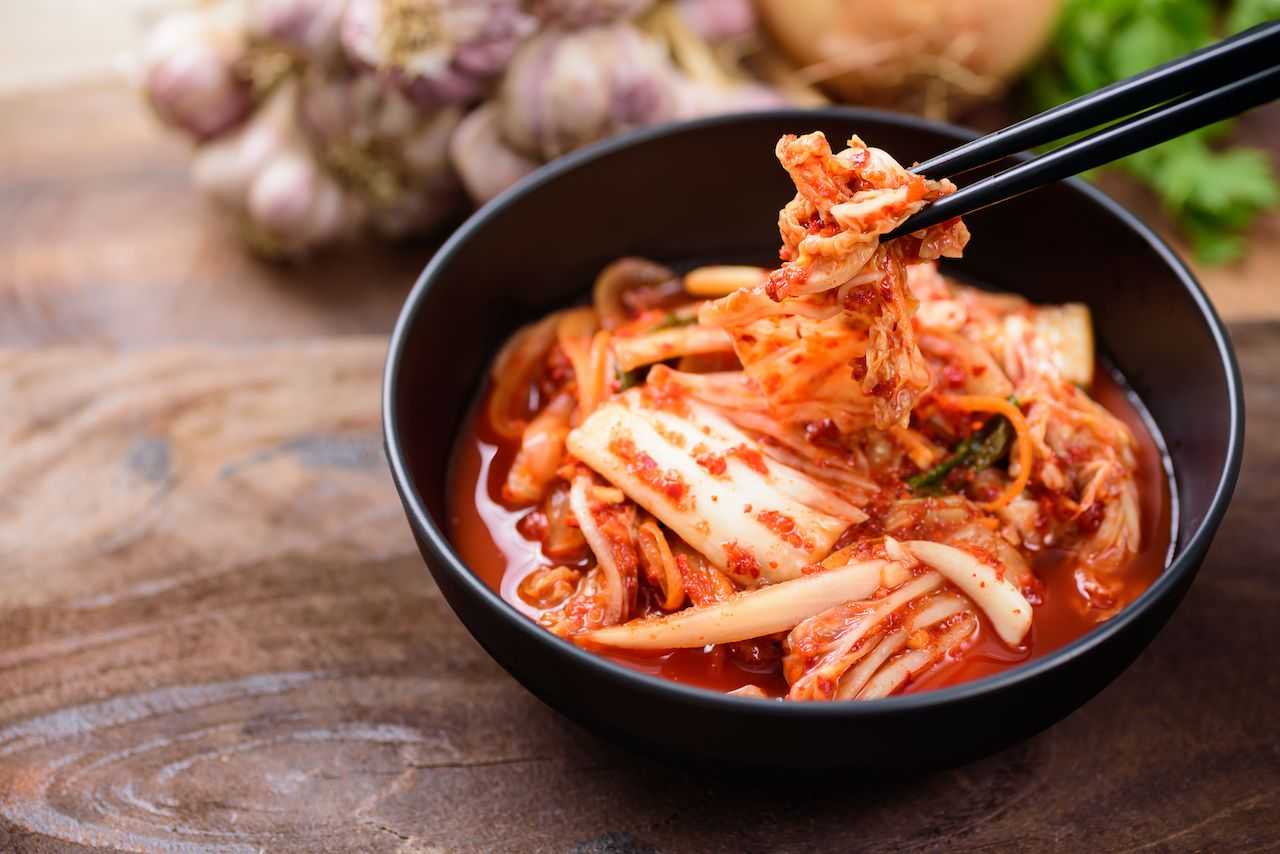
Kimchi is a traditional Korean dish made of fermented vegetables that are beneficial to one's health and appearance. It contains antioxidants and vitamins such as Probiotics, vitamins A and C, and several types of vegetables that are good for the skin, such as celery and cucumber. Probiotics are commonly used as a topical treatment for acne and other skin conditions such as eczema and dermatitis.
According to the Nutrition Society, kimchi is the most popular vegetable and the second most popular food in South Korea. It's served with almost every meal for a reason: Fermented foods like kimchi and kombucha are excellent for achieving a balanced diet and glass skin.
BLACKPINK's Rosé, who adores Korean cuisine, told a fan that kimchi stew is one of her favorite Korean recipes. She and Bae Suzy have a rosy glow that is to die for, and if these K-Pop stars eat kimchi as part of their diet, then trying it all for the sake of K-Beauty would not be a terrible idea. It is recommended that you consume one serving (100g) of kimchi every day. Since it is simple to make at home, consider it part of your beauty routine by incorporating kimchi into your diet. Kimchi contains beta carotene and healthy microbes for your health and skin.
2. Seaweed soup (Miyeokguk)
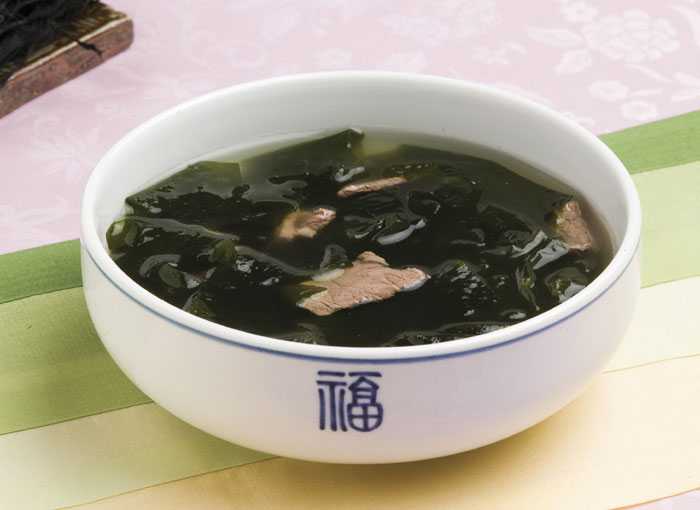
In South Korea, seaweed soup or miyeokguk is associated with good health and is frequently consumed during birthdays and after childbirth. South Korea is so obsessed with seaweed that it has seaweed farms that can be seen from space. Seaweed is used as a side dish (banchan), wrap rice rolls (gimbap), and chips. There are a variety of reasons why Western society should embrace seaweed.
Seaweed is rich in minerals because they contain all of the minerals found in the sea. They also include sulfates, which are anti-inflammatory, antioxidant, and cancer-fighting compounds.
This September, BTS will release TinyTAN Gim snacks, which are dried seaweed snacks with various flavors from wasabi to butter-garlic. So if you want to eat seafood without feeling guilty, try this new seaweed snack or other Korean seaweed chips on the market.
Alana Kessler, the dietitian behind wellness micro boutique Be Well, said, "Seaweed provides several health advantages, including Vitamin K, C, and calcium. However, the iodine content has the most influence. Iodine shortage can impact the thyroid, resulting in fatigue, muscular weakness, and high blood cholesterol."
3. Pu Erh tea
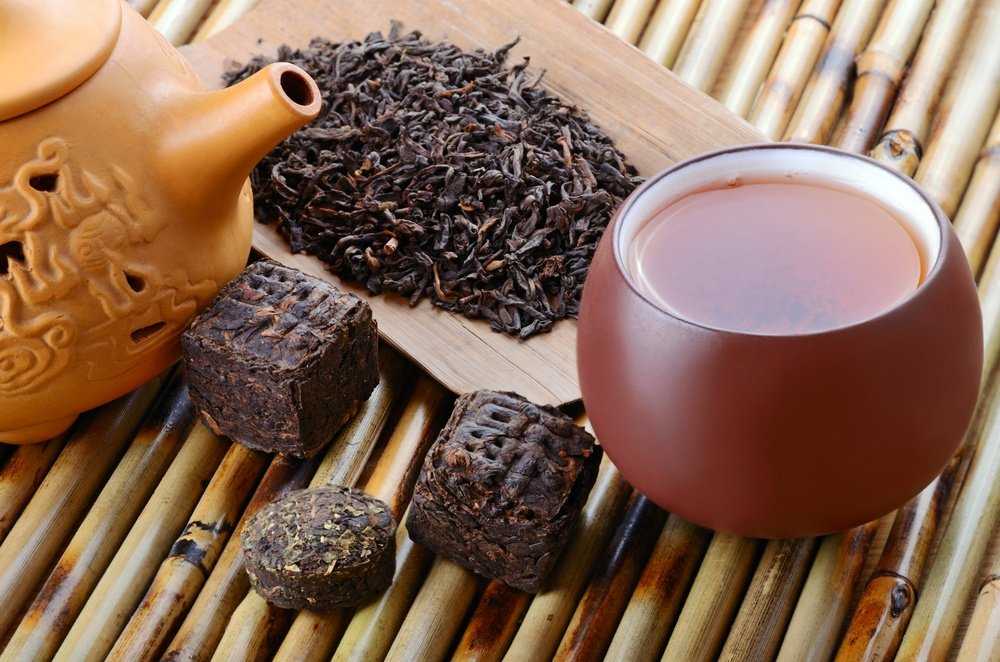
Teas are an excellent source of hydration and antioxidants. Many provide antioxidant advantages depending on the tea they drink. Drinking a cup of hot tea can also be relaxing, lowering stress levels, and thus enhancing general health. Barley, ginseng, and green teas are popular in South Korea. Other Korean teas are a great alternative to achieve glass skin.
Kwon Yuri, the former Girls Generation member, and actress has consistently been recognized for her flawless-looking skin. Her skin looked great onscreen when she starred in the Korean drama Breakup Probation. "I'm drinking Pu Erh tea," she exclaimed on Instagram. Tea cleanses your system and eliminates undesired pollutants in your body, much like a "car wash" for your body," she stated.
As Yuri pointed out, the Pu Erh tea is commonly drunk with meals in China to help clear body impurities, assist digestion, and metabolize fat. Pu Erh comes from the South Korean island of Jeju. It is lighter, more refined, and sweeter than a typical Chinese Shu Pu Erh from Yunnan, similar to other green teas from the same province.
This Korean tea is high in antioxidants and vitamins, and it's commonly used to help people lose weight, improve digestion, and enhance skin texture. That is also why Pu Erh tea is such an excellent beauty drink: the digestive system receives essential nutrients from their diet and eliminates undesired toxins internally. By maintaining a healthy digestive system, you can protect your skin from becoming dull and irritated, such as acne and allergies.
4. Soups and stews
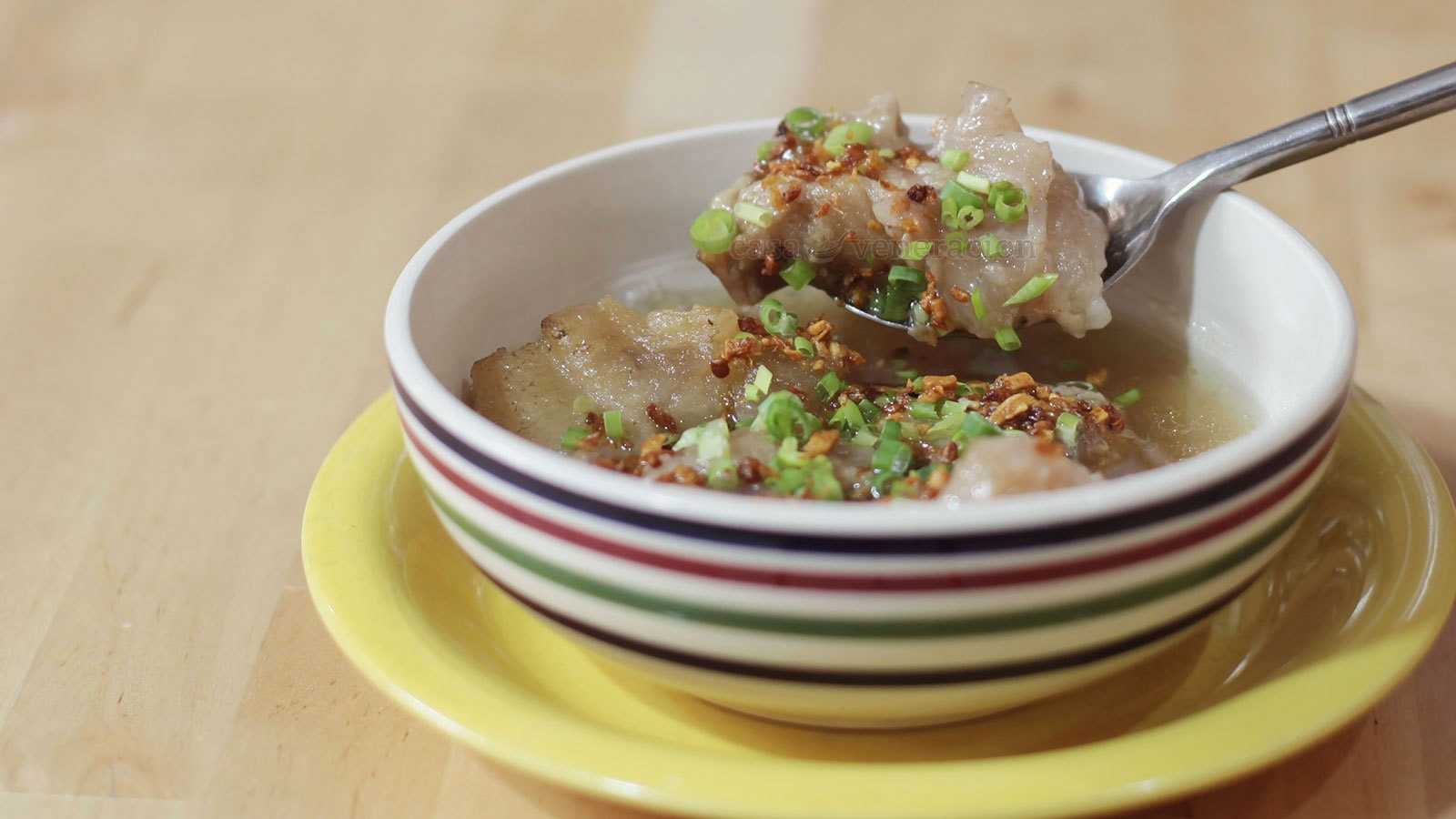
In the form of soup or stew, collagen is present in every Korean meal. As a basis, chicken, fish, beef, and bone broths are commonly utilized. Korean soup dishes include Dak Gomtang (Korean Chicken Soup), Seolleongtang (Korean Milky Beef Bone Soup), and Beef Tendon Gumtang Collagen Soup (see above photo).
Korean cuisine uses beef tendon as an ingredient. It's a stiff, fibrous muscle that softens after being cooked for a long time. Even though it is low in fat, it includes a lot of collagen and has the feel of high-fat cuts of beef.
Collagen is the most prevalent protein in the body and an essential structural component of connective tissue. Collagen is critical to the health and strength of cartilage, skin, bones, etc. A collagen-rich diet has been shown to promote skin health and help fight skin aging.
5. Makgeolli
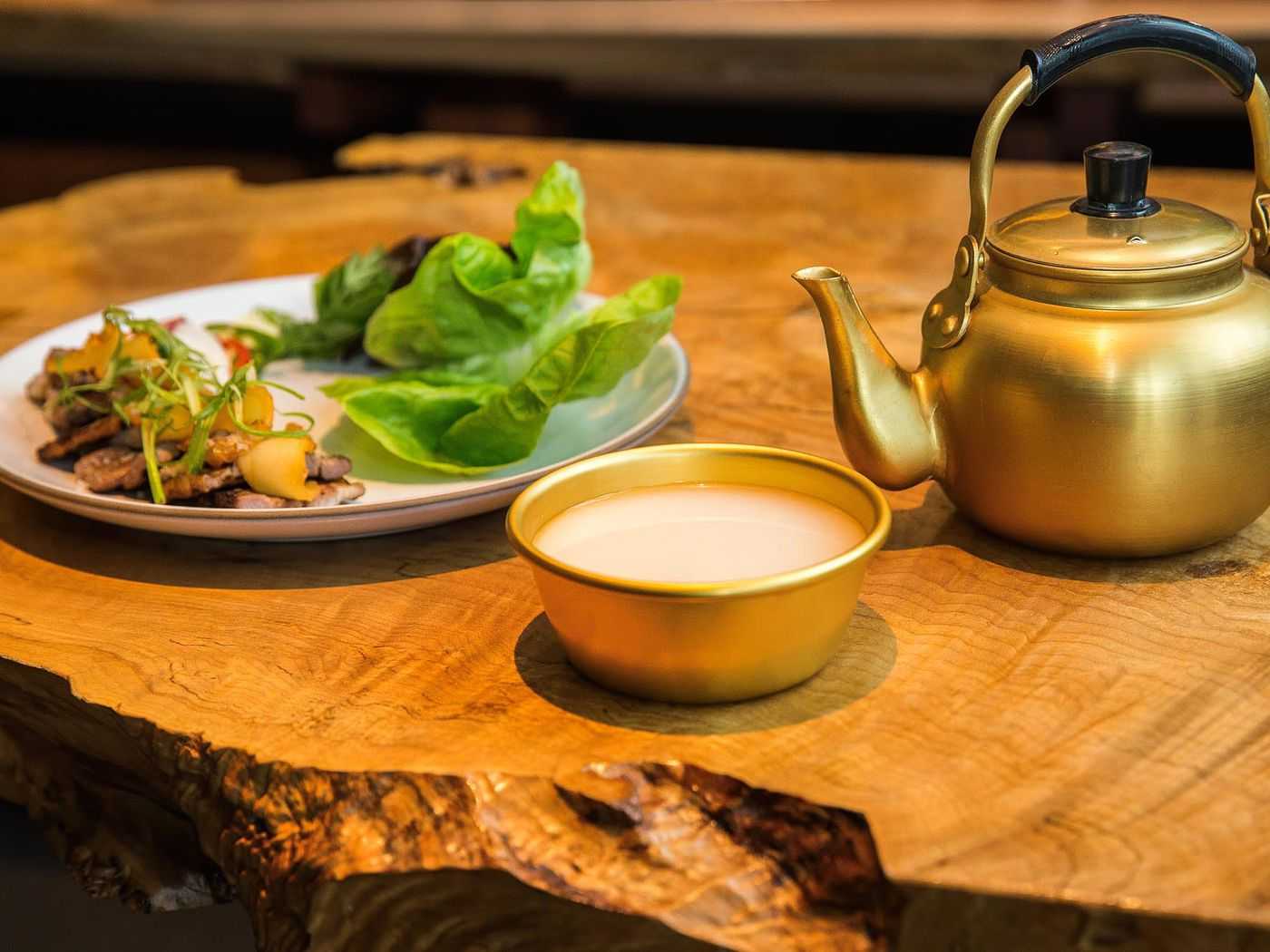
Makgeolli is a mildly sweet rice wine with an alcohol content of 6 to 8% by volume. Probiotic cultures suitable for the digestive system and the skin are abundant in this alcoholic beverage. Amino acids and vitamin B are included in it, which assist in tightening and brightening the skin. Vitamin B, notably vitamin B3, can help with acne and blemishes, and probiotics are beneficial to gut health.
This famous alcohol beverage also contains mineral oils and fermented rice wine extract, which refines the skin's appearance to make it more transparent and smooth. Lemon, rosemary, thyme, and jasmine extracts are also included to help balance the skin. However, because makgeolli is an alcoholic beverage, it should be consumed in moderation, like beer, wine, or liquor. The suggested serving size for makgeolli, which contains 6 to 8% alcohol, is one 8-ounce serving for women and two 8-ounce servings for men."
6. Soybean Soup (Doenjang Jjigae)
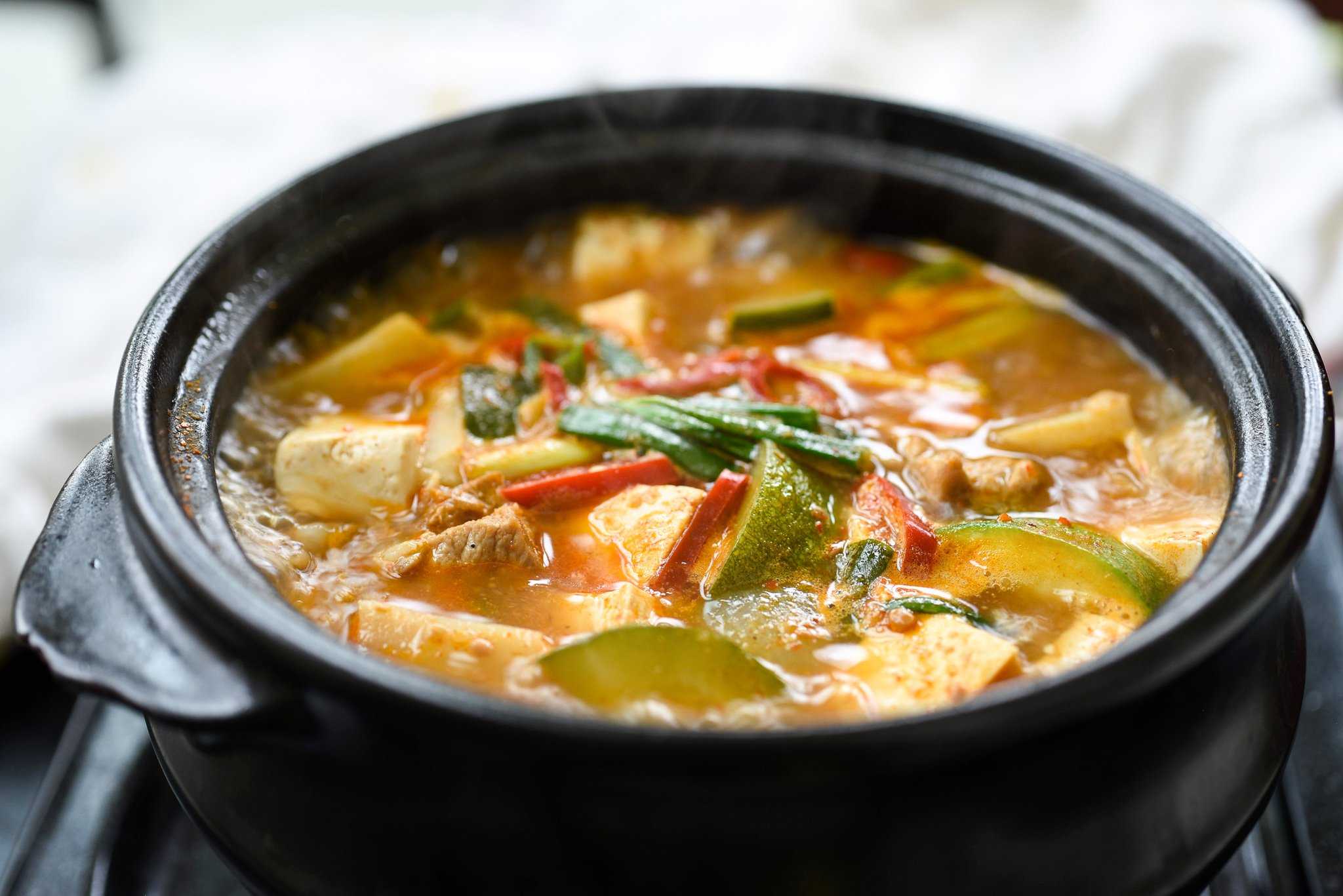
Soybean soup is a popular dish in Korea because it is inexpensive and healthy. The soybean paste is high in vitamin E and antioxidants, which help protect the skin from UV damage and produce a healthy glass skin glow. Soybean is relatively inexpensive in Korea, and soybean ladies spend money on fancy coffees and lunches while eating cheap soybean.
We can't blame them for being addicted to this Korean dish since it's ultra-healthy and suitable for K-beauty regimes.
Doenjang-jjigae, or soybean paste stew in English, is a classic Korean jjigae cooked with doenjang as the main ingredient with optional vegetables, fish, and meat. Doenjang is a traditional Korean condiment prepared from soybeans and salt that possesses anti-obesity, anti-diabetic, anti-cancer, and anti-inflammatory properties.
Doenjang includes a lot of bioactive components, including isoflavones and saponins, because of the fermenting process. Doenjang is also high in vital amino acids, minerals, vitamins, and phenolic compounds necessary for healthy, bright skin.
Now you know what you should eat if you're looking for a way to achieve glass skin and satisfy your Korean food cravings at the same time!

